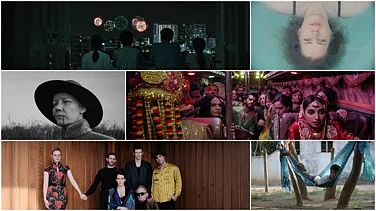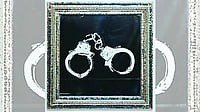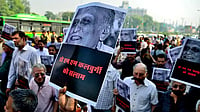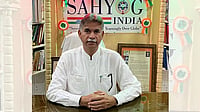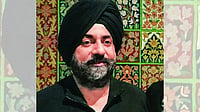Majaz is sitting across from me…He recites a poem and the children forget they were playing. It’s a Calcutta evening, Majaz is crying. It’s a Bambai night, Majaz is dancing. It’s blurred out Lucknow, Majaz walks on drenched in the rain. It’s a political rally, and Majaz looks pensive. It’s a poetic congregation or maybe a literary conference, Majaz seems intoxicated. His name is being announced on radio and he is just smiling. He is right here in front of me with a thousand hues of his personality…This night, December 5, 1955, concludes a thousand nights…Death had been calling him somewhere from the sky since long. And he too had been headed towards death.
This is how eminent Urdu poet Ali Sardar Jafri recalls his friend Asrarul Haq Majaz, better known as Majaz Lucknowi, in an obituary in his book Lucknow Ki Paanch Raatain. Jafri was a leading light of the Progressive Writers’ Association, which grew out of the friends-driven Progressive Writers’ Movement in pre-Partition India. The comradeship among them was based on a shared concern for the deprived, dispossessed and disadvantaged people. Stories of their friendship are now part of the subcontinent’s literary folklore as tales of universal human love and trust. Jafri’s book details the idealism that he and his fellow poets and authors inherited from the Independence movement, his travelogues, friendships and associations with world famous humanist poets like Pablo Neruda and Nazim Hikmet. In fact, Jafri had named his sons Nazim and Hikmet after the Turkish poet.
Due to mental health issues, Majaz was admitted to Ranchi’s psychiatric hospital—where Bengali poet Kazi Nazrul Islam too was undergoing treatment—with the help of Sarojini Naidu, who was closely associated with the progressive writers. Even though Majaz had been discharged, he hadn’t fully recovered. On December 4, 1955, Majaz was putting up with his friends, Sardar Jafri and Sahir, in a hotel room. Sahir had brought a bottle of exquisite whisky for him. A promise was extracted from Majaz that he won’t drink it during the day and wouldn’t go out with his Lucknow “friends” in the evening. On Majaz’s advice, the bottle was locked in a cupboard. In the afternoon, Sardar Jafri and Sahir left for a conference while Majaz was asleep. Their return to the hotel room got a little delayed. And during this period Majaz was whisked away by some of friends for a get together. In the bitter cold night, they kept drinking on the roof of a tavern under the open sky. Then they left one by one, leaving Majaz alone in an inebriated state. He died of brain haemorrhage and pneumonia the same night. He was 44.

On a TV show, Javed Akhtar, noted film writer and poet, once talked about the friendship between Majaz, who was his maternal uncle, and Sahir. Both of them had gone to Mumbai together to try their luck in the film industry. But Majaz was quick to realise the manipulations of the art market. So he returned to Lucknow whereas Sahir stayed put. Unlike Majaz, he didn’t have a place to call home. But before Sahir bid Majaz adieu at the railway station, he promised him, “Next time when you come to Bambai, I’ll come to receive you along with my chauffeur.”
Even though Sahir was a close friend of Jan Nisar Akhtar, another prominent progressive poet and Javed Akhtar’s father, he was Javed’s friend as well. When Javed was struggling to find a foothold in the industry, he was not on speaking terms with his father. He would sleep on footpaths and corridors of buildings. He would usually visit Sahir in the evening. But one day, he appeared at his home in the morning. After breakfast, Javed requested Sahir to help him find some work.
Sahir, who was at the zenith of his career at that time, spoke some words of assurance nonchalantly while combing his hair. Talking about his own struggle, Sahir then pointed at some cash on a table, and told Javed, “Take it and return it later.” With a lump in his throat and moist eyes, Javed recalled it at a public function, “Sahir could have handed the money to me. But look at the sensitivity of that man, he felt it may look offensive to me. He didn’t have the courage to do so. He was trying to give me money and yet was talking like a thief.” After some time, Javed left his house with Rs 200—which according to him, used to be a big amount those days. Many years later, Javed adds, he too became a big name in the film industry. It was a time when he would touch soil and it would turn to gold. They were now working together and attending silver and golden jubilee celebrations of their films. At such parties, he would tease Sahir that he wouldn’t return his money. Occasionally, Sahir would shyly retort, “I know how to get back my money.”

But this phase too didn’t last long. Sahir died of cardiac arrest on October 25, 1980. He was just 51. And Javed was the first among the few who reached his sprawling Juhu home, Parchhaiyan (Silhouettes), which was named after his epic war poem, within minutes after hearing the tragic news. Next day, as soon as Javed was leaving the Juhu Muslim Cemetery—where Sahir was laid to rest—a person approached him, saying, “I left home in a hurry after hearing about Sahir’s demise. I forgot to bring my wallet. Do you have some money, we have to pay the gravedigger?” As Javed reached for his wallet, he recounts, “I enquired, ‘How much?’ And pat came the reply, ‘Rs. 200!’” Javed, who has co-written blockbusters like Sholay and Deewar with Salim Khan, recently claimed he is better equipped than anyone else to write a biopic of Sahir.
Shabana Azmi recalls an interesting story about how she got admitted to an English-medium school. Those were the days when her family used to live in a Mumbai commune at Red Flat Hall of the Communist Party of India. Her school required that both parents speak English. So she had to fake her entry into the school through family friends. In a moving tribute to her father, she writes, “Sultana Jafri, Sardar Jafri’s wife, pretended to be my mother and Munish Narayan Saxena, a friend of abba’s, pretended to be my father.” Besides poetry, Kaifi Azmi, another progressive poet, was well-versed with the virtue of friendship in equal measure. A few years after Sahir’s death, when Kaifi came to Sahir’s birthplace Ludhiana to attend a mushaira, he poignantly remembered his friend:
Tumhare shehar mein aaye hain hum, Sahir kahan ho tum
Ye rooh-poshi tumhari hai sitam, Sahir kahan ho tum?
(We have arrived in your city, where are you Sahir
This absence of yours is a torment, where are you Sahir?)
When his filmmaker-actor friend Guru Dutt died in 1964, he wrote a ghazal, “Rehne ko sada dehar me aata nahi koi, tum jaise gaye aise bhi jata nahi koi (No one comes to stay on this earth forever. Yet no one departs the way you did).”

Noted poet and writer Gulzar turns nostalgic talking about poet-lyricist Shailendra. During those days, Gulzar used to work in a garage. And he had met Shailendra during a practice session of the Bombay Youth Choir. He credits Shailendra for his entry into the film industry. “He egged me constantly to write and that’s how I ended up penning my first song, Mora gora ang layle for Bimal Roy’s Bandini. He was my friend, philosopher, guide and I learnt a lot from him.” From those days, Gulzar cites an example of comradeship between Indian and the Pakistani writers and artists. Faiz Ahmad Faiz had been imprisoned when his poem Hum jo tareekh raahon mein mare gaye (We who were executed in the darkest lanes), slipped out of jail. Believing that Faiz was feeling depressed, a meeting was held and it was decided that a written representation would be sent to the Pakistan government, reassuring Faiz that the movement was still on and he must not feel disheartened. The poem, however, was Faiz’s tribute to American couple Julius Rosenberg and Ethel Rosenberg, who were executed on the electric chair for their “political ideology”. It is widely believed that they were framed by the government for holding communist views and during the trial, the couple was demonised by the press for their leftist ideals.

Interestingly, there are several examples in Urdu poetry, where poet friends borrowed lines from each other. On the insistence of film director Yash Chopra, Majrooh Sultanpuri borrowed a telling line from Faiz’s iconic poem Mujh se pehli se mohabbat mere mehboob na maang (My love, don’t ask me for the love we once shared). Chopra was adamant to have the sentence Teri aankhon ke siwa duniya mein rakha kya hai (What is there to behold in this world except for your eyes) weaved into a song for Chirag (1969) starring Sunil Dutt and Asha Parekh. Sultantpuri wrote to Faiz, requesting permission to let him use his sentence. Being a good old friend, Faiz agreed readily. And later, the song was immortalised by Mohammad Rafi and Lata Mangeshkar.
When Majaz was taunted for his drinking habit, he would fire back, Main sharaab peeta hon, tum kya peetay ho? Aadmi ka khoon? (I drink liquor, what do you drink? Human blood?) Sahir used this expression when he wrote lyrics for a song sung by Mohammad Rafi in Naya Raasta (1970). It was picturised on Balraj Sahni: Maine pi sharaab, tumne kya piya? Aadmi ka khoon?

The friendships that were forged in the pre-Partition days continued to thrive despite wars and strained diplomatic relationships between India and Pakistan. Needless to say, the culture, history and the struggles of the common people didn’t see much change even after Partition and creation of three countries, India, Pakistan and Bangladesh. Faiz and Makhdoom Mohiuddin were also good friends and fellow poets. Faiz chose Pakistan whereas Makhdoom stayed in India after Partition. On hearing about Makhdoom’s death in 1969, Faiz wrote an evocative poem using rhymes and metre of Makhdoom’s immensely popular ghazal, Aap ki yaad aati rahi raat bhar (Memories of yours kept overwhelming me, all night long). Similarly, Sardar Jafri wrote a poem in response to a poem written by Pakistani poet, Ahmad Faraz, that talked about friendship between India and Pakistan: Chalo main haath badhaata hun dosti ke liye. (Come on, let me extend the hand of friend!) And Jafri replied:
Tum aao gulshan-e-Lahore se chaman-bardosh
Ham aaen subh-e-banaras ki roshni le kar
Himalaya ki havaon ki taazgi le kar
Phir is ke baad ye puchhein ki kaun dushman hai!
(You bring us flowers from the garden of Lahore
We bring the dawn of Benaras for you,
We bring the fresh Himalayan breeze for you,
Then let us sit down and ask each other,
Who is the enemy now?)

A strong votary of India-Pakistan friendship, Sardar Jafri believed that Partition was irrevocable and both the countries need to reconcile with it to transcend an ugly past. When Prime Minister Atal Bihari Vajpayee made the historic peace trip to Pakistan, he presented Sarhad, an album of anti-war poems penned by Sardar Jafri and sung by Seema Anil Sehgal to his Pakistani counterpart Nawaz Sharif as a gift from India. And this is how his friend I.K. Gujral, another former Prime Minister, remembered Sardar Jafri after his death, in an article titled In Love With Poetry and Revolution: “Sardar Jafri was a true nationalist, a tall thinker and protagonist of composite culture of India.” According to him, Sardar Jafri was never after money or material things. “One quality with Sardar was that he never told you of his financial difficulties. He never asked for a personal favour,” he narrates, adding, “A good company of friends, a heart full of compassion for the poor, love for children, optimism, humanism and a strong belief in Indo-Pak peace were some traits of his impressive personality.”
After the Kargil war, Gulzar wrote a poem in which he poignantly remembered his late friend Ahmad Faraz through metaphors from one of latter’s popular ghazals. The poem was also an ode to ghazal singer Mehdi Hassan, who was suffering from throat cancer at that point in time:
Aankhon ko visa nahi lagta
Sapnon ki sarhad hoti nahi
(No visas are required for the eyes,
Dreams know no borders)

Ghazal maestro Jagjit Singh and poet Nida Fazli too were great friends and votaries of India-Pakisan friendship. “My condition is just like a bird separated from its flock,” Nida told this writer once in 2011, referring to deaths of his friends, including Jagjit Singh in quick succession. Incidentally, Jagjit was born on February 8, 1941. Nida died on February 8, 2016. Speaking at a commemoration function, the poet who had teamed up on several occasions with Jagjit, paid tribute to him:
Khamoshi aaeena ban jaati hai,
Teri aawaz nazar aati hai !
(Silence turns into a mirror,
Your voice becomes visible)













